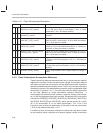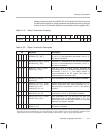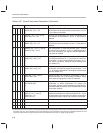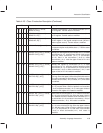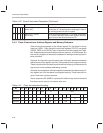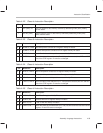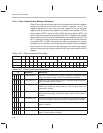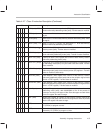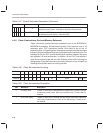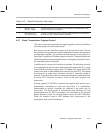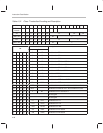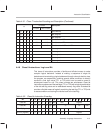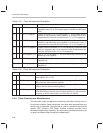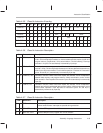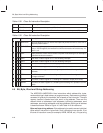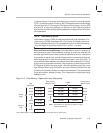
Instruction Classification
4-38
Table 4–27. Class 5 Instruction Description (Continued)
C5 Mnemonic Description
1 1 1 1 0 RPT {
adrs
}
8
Load repeat counter with lower 8 bits of data memory location referred by
addressing mode {
adrs
}. Interrupts are queued during execution.
1 1 1 1 1 MOV STAT, {
adrs
} Load status (STAT) register with effective data memory location referred
by addressing mode {
adrs
} (17 bits with TAG).
4.4.6 Class 6 Instructions: Port and Memory Reference
These instructions provide the basic expansion port of the MSP50P614/
MSP50C614 processor. IN instructions transfer 16-bit data from one of 16
expansion ports. OUT instructions transfer 16-bit data to one of the 16
expansion ports. In a typical system, the expansion ports are divided into those
that serve internal peripheral functions and those that serve external pins. For
subclass 6b, IN and OUT provide bidirectional transfers between the same
port address (16) and accumulator. In addition, IN and OUT instructions in
class 6b can communicate with an extra 48 ports (a total of 64 including the
shared ports). Class 6b instructions also have reference to the string bit for
checking the arithmetic status of a string transfer.
Table 4–28. Class 6a Instruction Encoding
Bit 16 15 14 13 12 11 10 9 8 7 6 5 4 3 2 1 0
Class 6a 1 1 0 0 C6a
port4 adrs
Class 6b 1 1 1 0 1 1 s A
n port6
C6b ~A~
Table 4–29. Class 6a Instruction Description
C6a Mnemonic Description
0 IN {
adrs
},
port4
Transfer a 16 bit value of addressed port to data memory location referred
by addressing mode {
adrs
}. Refer to port address map. Transfer status is
modified.
1 OUT
port4
, {
adrs
} Transfer a 16 bit value in the data memory location referred by addressing
mode {
adrs
} to addressed port. Refer to Port address map. Transfer is sta-
tus modified.



